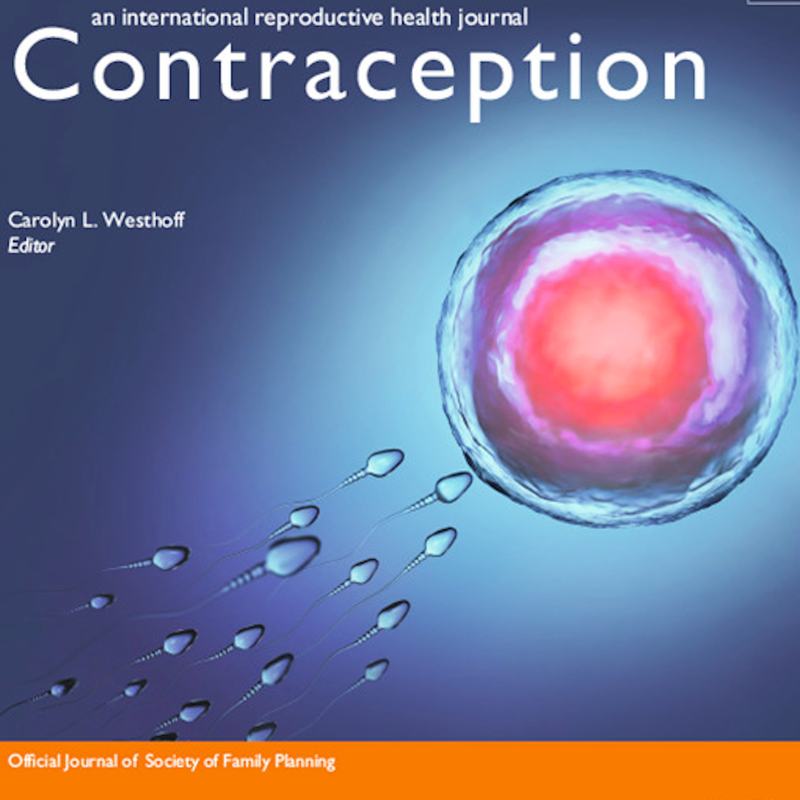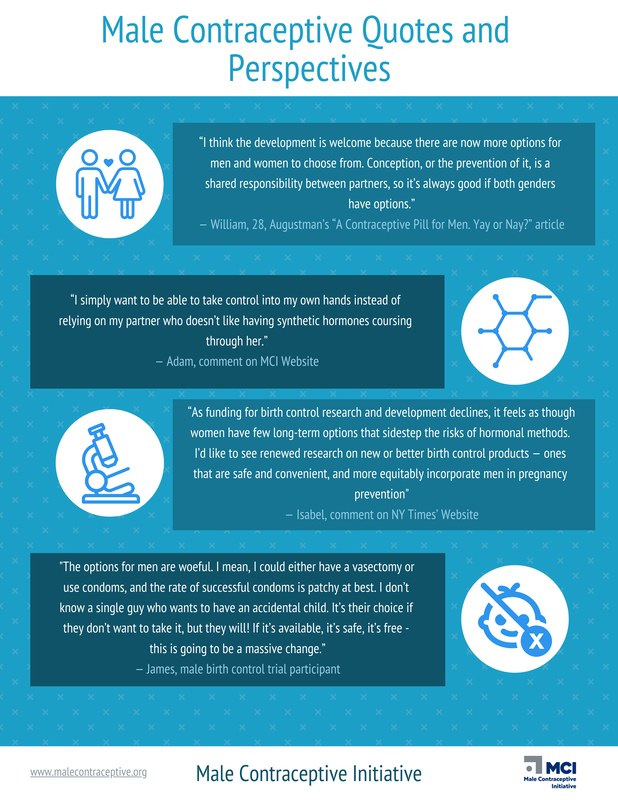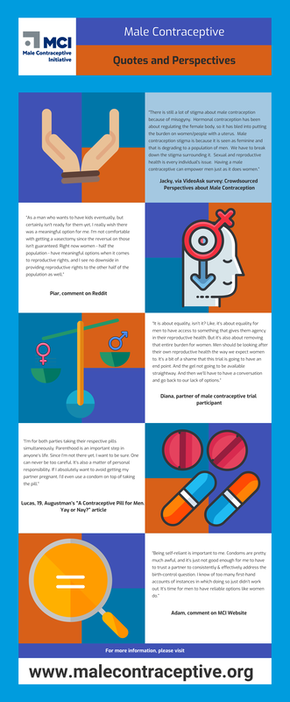This chapter will explain how we envision male contraceptives will bring to reframe the culture of discussing contraceptive options and family planning as a “Couple”. By providing different perspectives from men and women on the concept of contraceptives, you will be able to have more insight into this topic.
Key Points/Learning Objectives
- How male contraception plays a role in reframing family planning conversations as a couple
- People’s perspectives and attitudes towards male contraception
Shared Risk
It takes two to tango. So how is male birth control going to impact relationships? How is it going to change communication, sex, and understanding? We’ll talk to some couples using male birth control in clinical trials, and others who see the future in male contraception.
“We Said” is men and women telling you how male contraception is going to change their lives. Listen to their motivations, their experiences, and their desires to have new options, together. Because it’s not he said, she said. It’s We Said.
Episode Seven - We Said
|
"'Shared risk': Reframing risk analysis in the ethics of novel male contraceptives"
Male Contraceptive Initiative's Logan Nickels co-authored this paper seeking to make a case can be made that use of a male contraceptive, even one associated with a very small risk of serious side effects and even death, is justifiable in a risk-benefit analysis as long as the overall risk to a given couple, the ‘‘shared risk,” is at or below the risk of currently available combined hormonal contraceptives or unintended pregnancy. |
"Will Men Use Novel Male Contraceptive Methods and Will Women Trust Them? A Systematic Review"
Novel male contraceptives have been in development for almost as long as female methods, yet there are no products available on the market. Hormonal approaches tested clinically to date include the use of oral, injectable, implant, and transdermal methods. The study of attitudes toward male contraception has been inconsistent and there have been no systematic reviews drawing these data together. A group of researchers conducted a systematic review of the available evidence for male and female acceptability of novel male contraception, and identified 32 studies and present a narrative synthesis of quantitative data and a thematic synthesis of qualitative data. This paper shares the results of that work.
Novel male contraceptives have been in development for almost as long as female methods, yet there are no products available on the market. Hormonal approaches tested clinically to date include the use of oral, injectable, implant, and transdermal methods. The study of attitudes toward male contraception has been inconsistent and there have been no systematic reviews drawing these data together. A group of researchers conducted a systematic review of the available evidence for male and female acceptability of novel male contraception, and identified 32 studies and present a narrative synthesis of quantitative data and a thematic synthesis of qualitative data. This paper shares the results of that work.
MCI’s Lemonade Stand: “'Shared Risk' and the Ethics of Male Contraception
Shared Risk is just one of the many ways that male contraceptives can change the way we think about long-standing norms. With the potential to improve relationships, gender dynamics, and reproductive autonomy for all, male contraceptives represent an opportunity for men and women alike.
Shared Risk: Addressing the Ethics of Male Contraception
He said, She said, They said…
In this section, we bring together stories from people regarding their attitudes towards male contraception and how it changes their perspectives in relationships. After listening to these different voices, you will have more insights into how male contraception plays an important role in people’s relationships and what people are looking forward to the future where there is more male contraception available.
Male Contraceptive Quotes and Perspectives
If you build it, will they come?
If you make a male birth control, will men use it? What do they care about? What sort of things do they want to see in a contraceptive? Three men who all have their own motivations, ideas, and opinions.
If you make a male birth control, will men use it? What do they care about? What sort of things do they want to see in a contraceptive? Three men who all have their own motivations, ideas, and opinions.
Episode Five – He Said
Would you trust your man to use male birth control?
Women have a very different relationship with birth control than men do. And a male birth control option may not be all that appealing to women, who have to bear the risk of pregnancy. We talk to three women who think there’s opportunity in male contraception, and are looking forward to the time when they can share in the role.
Women have a very different relationship with birth control than men do. And a male birth control option may not be all that appealing to women, who have to bear the risk of pregnancy. We talk to three women who think there’s opportunity in male contraception, and are looking forward to the time when they can share in the role.
Episode Six - She Said
This video highlights key learnings from the Couple Engage project on male engagement in family planning, focusing on specific insights from studies in India in the context of COVID-19.
Transformative Approaches to Engaging Men and Couples to Accelerate Family Planning Outcomes
|
Will Men Use Novel Male Contraceptive Methods and Will Women Trust Them? A Systematic Review" by John J. Reynolds-Wright, Nicholas J. Cameron, and Richard A. Anderson
In studies regarding hypothetical drugs, male willingness to use ranged from 13.6% to 83.0%. High proportions of women (42.8%–94.0%) reported willingness to use a novel male method in both hypothetical studies and actual drug trials. In qualitative studies, both men and women expressed the desire to share responsibility for contraception. There is consistent interest among both men and women in novel male contraceptive methods and willingness to use them.
|
Come hear 10 personal family planning stories from around the world. Community members will share their real-life experiences, diverse voices, and authentic perspectives on how family planning access and care is essential, especially during a pandemic.
REAL TALK, REAL STORIES, REAL FP















